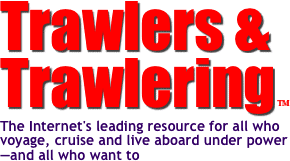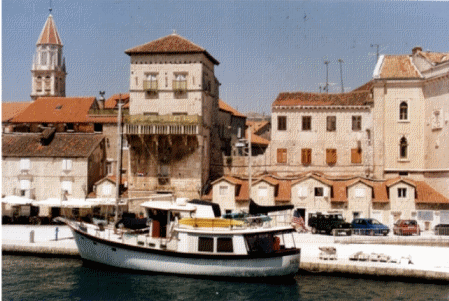 |
||
|
Fellow TWListees, Earlier Jim A., and more recently Joe E., asked me, off the list, about my recent experience crossing the Atlantic as a member of the crew of a Krogen 54. I've been concentrating on other matters since my return, and didn't really want to prepare a long report (or didn't quite know how to begin), so I replied to each as follows: Our crossing took four weeks (19 1/3 days at sea and 9 days in two ports). We left Ft. Lauderdale Wednesday morning, July 7th, and got to Lisbon Wednesday afternoon, August 4th. It was mostly uneventful except that we stayed in St. George, Bermuda, four extra days to replace the cylinder head gasket because of an oil leak, and we had to do without the active stabilizers for the last 7-8 days at sea because of a worn bushing. It was no wind or downwind all the way, and seas were rough for only 2-3 days before arriving at Horta, Faial, Azores. (Of course the stabilizers were off for the rough part.) After seeing a bit of the Lisbon area, I returned August 9th. Joe E. was more persistent, and followed up with some questions, which helped me to focus. I'm sharing his questions and my answers with all of you: Aw come on Joe. You can do better than that! That's a major life accomplishment and deserves more comment. Actually, crossing an ocean is a piece of cake, provided nothing goes wrong with the boat, the crew and the weather. Other things in life can be much more difficult. What's it feel like 500 miles from any harbor? It's nearly 900 nautical miles from port, at the midpoint. You are alone in your own little water world, extending no farther than the visual horizon a few miles away. Unless, of course, you are in constant contact with your broker, or whoever, by satellite telephone. Do you suddenly get apprehensive? Does every little engine noise get louder? No, piece of cake, etc. Do crew relationships hold up, deteriorate? The crew (Bob D., Lydia L. and I) got along very well and were very considerate of one another. The same was true of the skipper (Frank R.), except that he did get a little moody. This was understandable, since he was principally responsible for the boat and the crew, he had recently lost his mother and he had to leave his wife recovering from a painful medical condition. Do you get bored? No, on watch we each felt responsible for the boat and the crew; off watch we caught up on our reading, except when the dolphins came out to play. Do you get lonely? Yes. I missed my wife of 37 years; we are very devoted to each other. There were long telephone calls from St. George, Horta and Lisbon at about $2.00/minute. It was the same for Frank. Bob and Lydia had each other. Seasick? No. Was the crew competent? Yes, very. Bob even has a Coast Guard license. Skipper a jerk? Certainly not. Bob and I privately agreed that we would have done two things differently than Frank, but they were judgement calls and didn't make much difference in the end. Boat solid or a little ragged? The boat was fine. I was suprised by the high lubricating oil consumption of the recently rebuilt turbo-charged Ford-Lehman 225, but there was plenty of oil onboard. How rough was rough? Scary rough or uncomfortable rough? Neither really, but it did made cooking more difficult (we took turns). The seas were on the stern or the quarter and the autopilot groaned a lot as it moved the rudder to correct for yaw. The motion of the boat would have been worse if the seas were on the bow or the beam. It had been much rougher on a sailboat delivery I made from Bermuda to Antigua, standing watch while seas broke into the open cockpit during three days of heavy weather. This trip I slept well every night in the V-berth in the bow, impossible on the worst nights of the sailboat delivery even though we also had seas on the quarter. It did get a little weird when the engine was shut down once a day to check and add oil. As steerageway was lost, the boat turned beam to the sea and rolled more than at any other time. A hydraulic get-home motor on the main propeller shaft could have been used to maintain steerageway, but without remote engagement, using it for a short period of time was considered more trouble than it was worth. I compared notes in Horta with the crew of a Nordhavn 46, which had a small diesel get-home engine on a separate shaft with a folding prop. When they tried to use it to maintain steerageway during main engine maintenance, the engine started, but the prop was fouled with marine growth and wouldn't unfold. Diving to free it was considered more trouble than it was worth. What differences did the loss of stabilizers make? The boat rolled a lot more while under way. Did you skirt disaster? Sunny skies the whole way? It was sunny most of the time and rainy part of the time. In either case, the enclosed pilothouse was more pleasant than an open cockpit. A high pressure region extended from Bermuda to the Azores before we left Fort Lauderdale. It lasted until we were two or three days from the Azores. After following a great circle course most of the way from St. George to Horta, we altered course 45 degrees to the south to put more distance between us and a gale moving east, north of the Azores. This added about 175 miles and 24 hours to the passage. The distant storm generated large but gradual swells, which were more fun than problematic. A sailboat left St. George a day ahead of us, bound for Horta. They had to motor north to find a breeze before turning east. If they had warning of the storm, I suppose they later turned back south to get out of its way. We did hear from another sailboat on Herb's net (below) that did turn south before the storm. When it passed, they were left with light winds and little fuel for motoring. Later, as we were approaching Portugal, they were approaching the Azores, out of food, but making light of their situation by claiming the record for the longest passage. We reached Horta with more than 25% of our fuel, and lots of food and beverages, remaining. Did you have shoreside communication for the whole trip? SSB? Could you "call home?" We had single-sideband radio to Pinoak in New Jersey, for internet e-mail. I exchanged messages with my wife in Oak Ridge and my daughter in Chattanooga. Did you use weather routing? Not the paid professional kind, but we did join the SSB weather network operated every evening as "South Bound II" by Herb Hilgenberg, formerly from Bermuda, now from Burlington, Ontario, outside of Toronto. Herb was very helpful, despite regular interference from other radio traffic in Russian. We also received weather fax, large-scale weather maps of the North Atlantic, from a SSB station in Boston. http://www3.sympatico.ca/hehilgen/nass1.htm I want to do this someday and I really want to understand from someone who has "been there." Inquiring minds want to know! Thanks for your persistence. Some of the highlights for me: • Passing Spit Buoy again and entering Town Cut into St. George Harbor. • Seeing the tallest lights on Faial rise above the horizon as my solitary watch ended at midnight • Attending a party given by the German skipper and the French crew (school teachers on vacation) of the sailboat we were tied to in Horta. Two charming young ladies from Corsica kept my glass filled with Tennessee whiskey and kept complimenting me on my English! (They said I was much easier to understand than guys from Scotland or Cornwall.) To a French sailor who had single-handed from Martinique, I raised my glass and said: "Je vous salue, monsieur!" He raised his glass and replied: "And I salute you, sir!" From the way he said it, I think he really meant it. • Being simultaneously confronted by two ships on radar, near the end of my watch at midnight, less than two days from Portugal. One was on a collision course. If I altered course to port to pass behind him I would get uncomfortably close to the other ship. After hearing the difficulty Bob had communicating on VHF radio with a Chinese watch officer on a previous watch, I didn't want to try communicating with two watch officers at the same time, so as we got into visible range, I temporarily altered course 90 degrees to starboard, showing them my red light, and passing well in front of the ship on collision course. (Yes, I was the stand-on vessel, but at night, I wanted to stay well clear of both ships.) • Passing Cabo da Roca, the westernmost point on the continent of Europe, going up the Rio Tejo to Lisbon, and passing under the 25th of April Bridge, modeled after the Golden Gate Bridge in San Francisco. Mostly lurking since 1 July 1997, and sometimes available as crew. Joseph J. Blass |
|||||||
|
||||||||
|
||
© 1997-2017 Water World Productions, formerly Trawler World Productions. All rights reserved. Reproduction of material from any trawlersandtrawlering.com page without written permission is strictly prohibited. Any copyrighted images remain the property of the copyright owner and are believed to be used with permission. Unsolicited letters, e-mails, articles and other materials submitted to us may be published, distributed and stored by Water World Productions and its assignees in whole or in part, in print or by any other means, including but not limited to electronic, and may be edited for clarity and space. Trawlers & Trawlering and its abbreviation T&T, I'd Rather Be Trawlering, Passagemaking Under Power and its abbreviation PUP, Trawler Buy-Sell-Trade, Trawler News, Circumnavigator, and Power Catamaran World are trademarks of Water World Productions.
|
||
